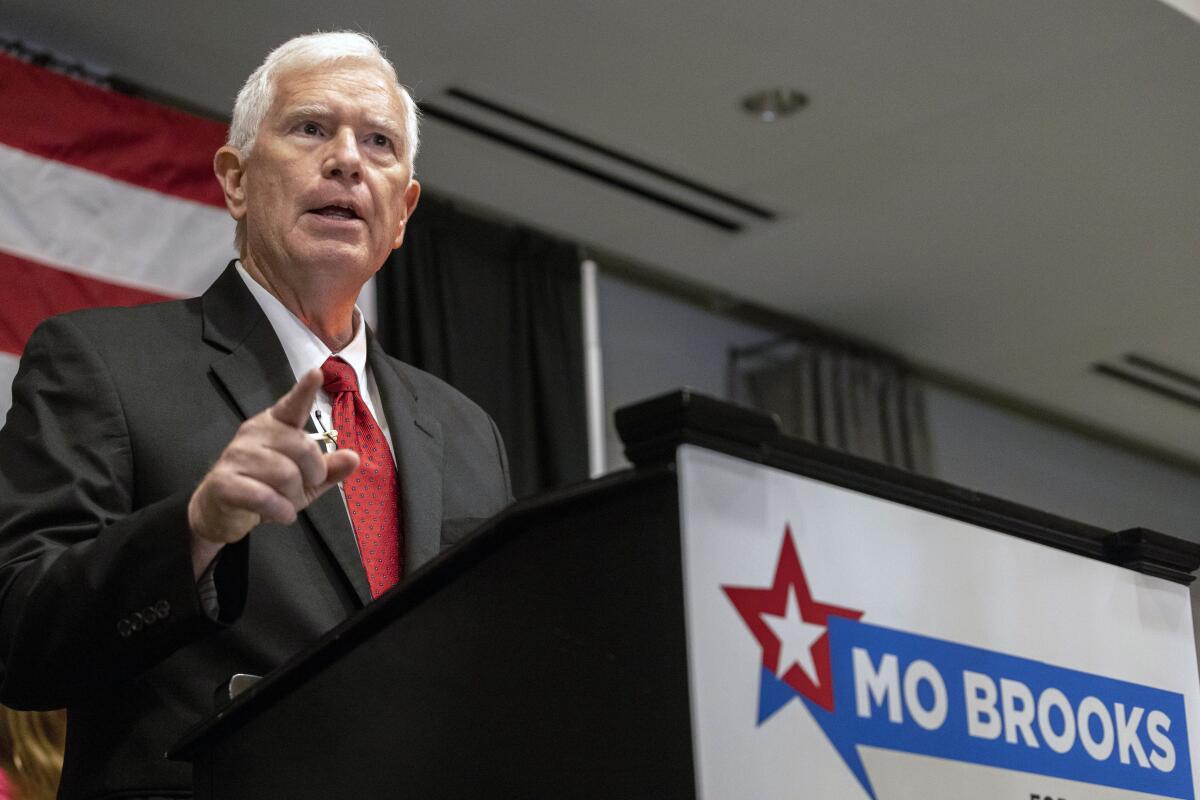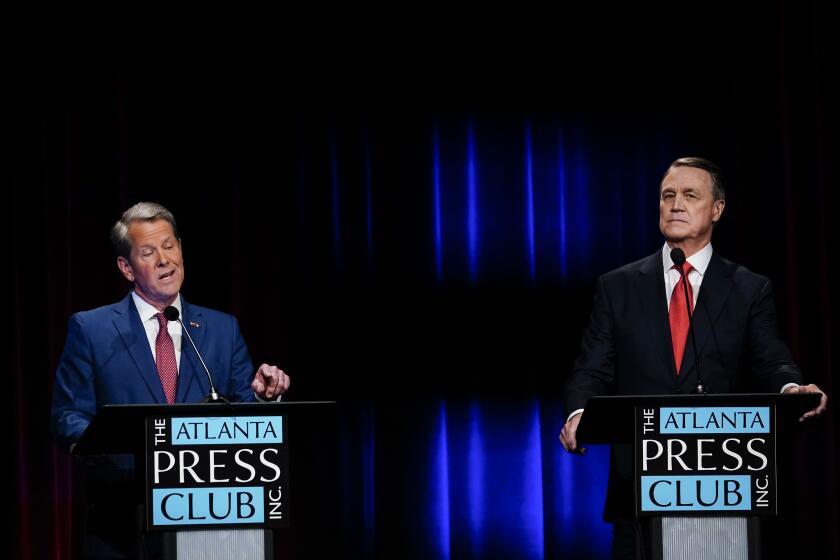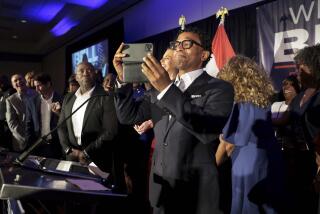The tale of two Trump endorsements: What to watch in Alabama Senate runoff, and D.C. mayor’s race

- Share via
MONTGOMERY, Ala. — The two Republican candidates in Alabama’s U.S. Senate primary runoff on Tuesday can each boast that at one point they had Donald Trump’s endorsement in the race.
Trump first backed U.S. Rep. Mo Brooks in the spring of 2021. That endorsement stood for nearly a year until Trump rescinded it as the conservative firebrand languished in the polls. The former president took his time in issuing a second endorsement, supporting Katie Britt in the race only after she emerged as the top vote-getter in the state’s May 24 primary.
In other races Tuesday, Washington, D.C., Mayor Muriel Bowser is facing voters amid growing concerns about crime. Runoffs in Georgia will resolve close contests in several congressional races and a secretary of state nomination, while primaries in Virginia will set up competitive congressional contests for the fall. Arkansas is holding primary runoffs for several legislative races.
What to watch in Tuesday’s primaries:
Alabama
The Senate runoff will decide the GOP nominee for the seat being vacated by 88-year-old Republican Sen. Richard Shelby, who announced his retirement in February 2021 after serving six terms.
Two months later, Trump announced his endorsement of Brooks, rewarding the six-term congressman who had objected to the certification of the 2020 presidential election and spoke at the “Stop the Steal” rally that preceded the Jan. 6 insurrection at the U.S. Capitol.
But Trump soured on Brooks as the primary campaign progressed, growing unhappy with his showing in the race and some of his comments urging the party to move on from the former president’s fixation on his 2020 election defeat. He pulled his endorsement last March.
Former President Trump uses primary endorsements to seek revenge, push election fraud lies and shape the Republican Party. How are his candidates faring?
Britt, Shelby’s former chief of staff and a former leader of a state business group, won the most votes in last month’s primary, capturing nearly 45% of the ballots compared to Brooks’ 29%. Britt had needed to earn more than 50% of the vote to win outright and avoid a runoff.
Another top candidate, Mike Durant, best known as the helicopter pilot who was held captive in Somalia during the 1993 battle chronicled in the book and film “Black Hawk Down,” finished in third place and failed to advance to the runoff.
Brooks has been backed by Texas Sen. Ted Cruz and Kentucky Sen. Rand Paul, both of whom campaigned with him. Britt comes into Tuesday’s runoff with a fundraising advantage and a shiny new endorsement from Trump, which came a couple of weeks after the primary.
The former president, who has a mixed record of success in backing winning candidates in this year’s midterm elections, waited to make an endorsement to help stave off the embarrassment of backing a losing candidate in a high-profile race.
The winner of the GOP race will face Democrat Will Boyd in November, though Democrats have found limited success in the deep-red state in the last 20 years.
Georgia
A Democratic contest for secretary of state headlines the Tuesday runoffs in Georgia, while Republicans will settle three congressional nominations.
State Rep. Bee Nguyen, backed by Democratic gubernatorial nominee Stacey Abrams, is trying to defeat former state Rep. Dee Dawkins-Haigler in the secretary of state’s race. The winner will face Republican Secretary of State Brad Raffensperger in the fall.
Raffensperger beat back a challenge in his May 24 primary from U.S. Rep. Jody Hice, who was endorsed by Trump. Trump made Raffensperger a top target for rebuffing his efforts to “find” enough votes to overturn Joe Biden’s win in the state’s 2020 presidential election.
In Georgia primary, Republican Gov. Brian Kemp easily defeats Trump-backed former Sen. David Perdue and will face Stacey Abrams. A key Trump rival, Secretary of State Brad Raffensperger, avoids runoff.
In congressional runoffs, Vernon Jones, a Trump-backed candidate and former Democrat, is competing against trucking company owner Mike Collins for the Republican nomination for the 10th Congressional District seat, east of Atlanta. Collins was endorsed by Republican Gov. Brian Kemp, who also won his primary over a Trump-backed challenger.
In the 6th District in Atlanta’s northern suburbs, emergency room physician Rich McCormick is trying to hold off Trump-backed lawyer Jake Evans. That race has revolved around accusations by each candidate that the other is insufficiently conservative.
The Republican winners in the 6th and 10th are heavy favorites in the November election over their Democratic opponents.
Republicans also have high hopes of knocking off 30-year Democratic Rep. Sanford Bishop in southwest Georgia’s 2nd District. The GOP is choosing between former Army officer Jeremy Hunt and real estate developer Chris West.
Virginia
In Virginia, voters will be picking Republican nominees to take on Democratic U.S. House incumbents in two of the most highly competitive districts in the country.
In the coastal 2nd District, which includes the state’s most populous city, Virginia Beach, four military veterans are competing for the GOP nomination. With a big fundraising lead and the backing of the Congressional Leadership Fund, a super PAC dedicated to electing House Republicans, state Sen. Jen Kiggans is widely seen as the front-runner. The winner will face Democrat Elaine Luria, a retired Naval commander and member of the Jan. 6 committee, in the general election.
In central Virginia’s 7th District, six candidates are jockeying to take on Democratic Rep. Abigail Spanberger, a former CIA officer.
Washington, D.C.
Bowser, the two-term mayor of Washington, D.C., is trying to fend off challenges from a pair of Council members as the district contends with rising crime rates and homelessness concerns.
Bowser has had a tumultuous second term that saw her repeatedly face off against Trump and walk a public tightrope between her own police department and a vocal coalition of activists led by Black Lives Matter. She is campaigning on the need for proven leadership and her history as one of the faces of Washington’s ongoing quest for statehood.
Her primary challengers are Robert White and Trayon White, who are not related to each other. Both accuse Bowser of favoring developers as spiraling costs of living drive Black families out of the city and of mishandling public safety issues amid rising rates of violent crime, like a Sunday night shooting that left a 15-year-old boy dead and a police officer and at least two other adults wounded.
The Democratic primary essentially decides the mayoral race in deeply blue Washington, D.C.
Robert White has a history of successful insurgent campaigns, having unseated an entrenched incumbent for an at-large Council seat in 2016.
Trayon White openly invokes the spirit of late D.C. Mayor Marion Barry, who remains a controversial but beloved figure among many Washingtonians. White was criticized in 2018 for claiming the Rothschilds, a Jewish banking dynasty and frequent subject of antisemitic conspiracy theories, were controlling Washington’s weather conditions. He later said he didn’t realize his comment could be construed as antisemitic.
Associated Press writers Jeff Amy in Atlanta, Sarah Rankin in Richmond, Va., Ashraf Khalil in Washington, and Andrew DeMillo in Little Rock, Ark., contributed to this report.
More to Read
Get the L.A. Times Politics newsletter
Deeply reported insights into legislation, politics and policy from Sacramento, Washington and beyond. In your inbox three times per week.
You may occasionally receive promotional content from the Los Angeles Times.












